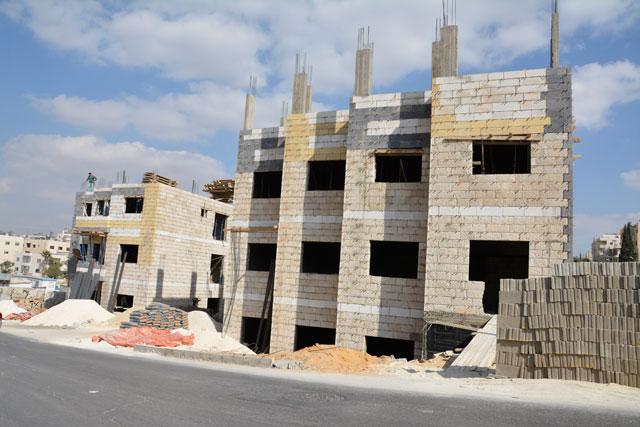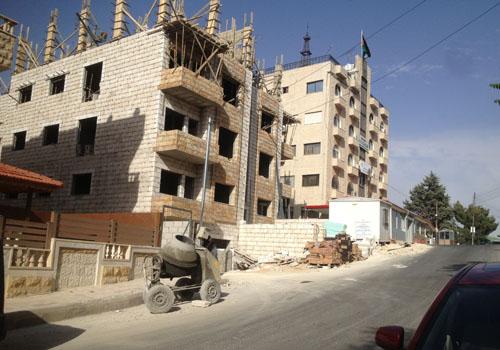You are here
Weak land purchases may shake up supply of housing apartments, jack up prices by 15%
By Omar Obeidat - Jan 06,2015 - Last updated at Jan 06,2015

AMMAN – Prices of residential apartments are likely to go up by at least 15 per cent this year as demand is projected to outweigh supply, Jordan Housing Developers Association (JHDA) President Kamal Awamleh said Tuesday.
Awamleh's comments came a day after an official report revealed that trading in the Kingdom's property market reached unprecedented figures. Real estate trading exceeded JD7.7 billion in 2014, a 22 per cent rise over the JD6.3 billion registered in 2013, and a 38 per cent increase over the JD5.6 billion in 2012.
According to the JHDA chief, the value of the 36,208 housing units sold last year was around JD5 billion. Sales of residential apartments increased in 2014 by 19 per cent, as a total of 30,380 units were sold in 2013.
The leading housing investor said the trading figures in the real estate market came in line with the association's forecast, adding that trading is set to continue an upward trend, but at a slower pace because developers would carry out less housing projects.
The uptrend would be driven by higher value of properties and not a greater number of residential apartments, he explained, attributing the projected slowdown in building homes to limited land plots available in the capital.
He cited figures from the Department of Land and Survey, which showed that sales of land only grew by 2 per cent, as an indicator for the projected slower building activity.
"Usually housing developers buy around 80 per cent of the land, but the slight increase in land sales shows that home builders are not buying land for their projects," he said, adding that demand for apartments is set to be greater than supplier, which he said would push prices up.
"We expect at least a 15 per cent increase in the prices this year," Awamleh noted.
Jordanian expats effect
Awamleh told The Jordan Times that, in 2014, Jordanians bought 90 per cent of the housing apartments valued at JD4.68 billion. DLS data showed that non-Jordanians purchased only 3,604 apartments valued at JD315 million.
He described Jordanian expatriates as the main driver for the sector's growth, noting that nearly 50 per cent of the apartments sold every year are usually bought by Jordanian professionals working in the Gulf region.
Expats find the property market as a safe investment, he said, explaining that some expats buy apartments and put them for rent.
Official figures estimate the number of Jordanians who work in the Gulf at nearly 750,000. They work there as engineers, doctors, bankers, accountants and consultants among other professions.
Shift to Amman outskirts
The JHDA president indicated that purchasing options inside the capital are becoming more limited due to higher prices caused by expensive land prices, noting that buyers have started to prefer the outskirts of Amman in areas such as Shafa Badran, north, and near the Airport Road, south of Amman.
The price of a square metre of land in Shafa Badran is around JD250, while in the western part of the city it reaches over JD800 per square metre, he said.
In some areas in western Amman, according to him, a square metre could be priced at JD1,500.
‘Investors not happy’
Awamleh said Jordanian housing developers are seeking investments outside the Kingdom due to restrictions imposed by the Greater Amman Municipality (GAM) on the number of floors allowed and due to banning projects in certain areas of the city such as Luweibdeh and Naour.
GAM officials were not available to comment.
He said that 150 housing companies have reduced their business in Jordan and are currently investing in other countries such as Egypt, Dubai, Turkey and even Kyrgyzstan.
"The sector is no longer attractive to major investors," he said, calling on authorities to give more incentives to the sector which supplies the state treasury with hundreds of millions in taxes and fees.
Related Articles
Demand for residential units is projected to outweigh supply this summer, according to Jordan Housing Developers Association (JHDA) President Kamal Awamleh, who said prices may surge by 15 per cent “at least”.
AMMAN — Women represent a crucial part in the national housing sector, President of Jordan Housing Developers Association (JHDA) Kamal Awaml
The Jordan Housing Developers Association (JHDA) on Wednesday demanded “fair and equal” enforcement of the Greater Amman Municipality’s (GAM) housing regulations to allow further growth of the sector.
















